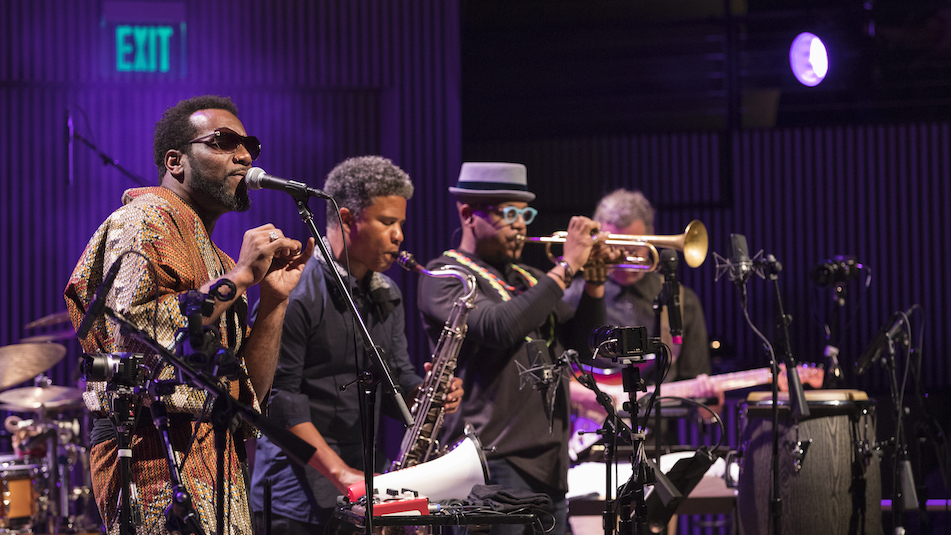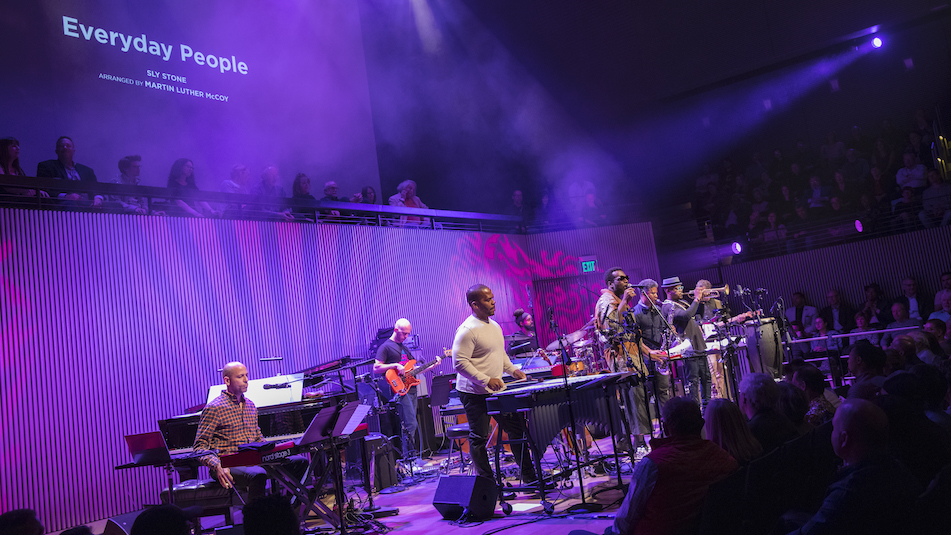SFJAZZ COllective:
Celebrating Sly & Miles
February 8, 2021 | by Jesse Hamlin

SFJAZZ Collective (photo: Scott Chernis)
We look forward to this week's “Fridays at Five” streaming concert featuring the SFJAZZ Collective in a November 2019 performance celebrating the 50th Anniversary of Sly and the Family Stone's Stand! and Miles Davis' In a Silent Way. Here are jazz journalist Jesse Hamlin's illuminating liner notes for the Collective's album Live: SFJAZZ Center 2019 recorded during that week.
“The music I was really listening to in 1968 was Jimi Hendrix, James Brown and Sly Stone,” Miles Davis recalled in his autobiography, Miles, noting with admiration that Sly’s music “had all kinds of funky shit up in it,” and that both Sly and Hendrix “were great natural musicians; they played what they heard.”
Always attuned to new sounds, Davis had used electric instruments on 1968’s Filles de Kilimanjaro, the last album by his towering ‘60s quintet with saxophonist Wayne Shorter, pianist Herbie Hancock, drummer Tony Williams and bassist Ron Carter. But he fully embraced electric sounds and dancing funk rhythms in 1969, when he and some prime young jazz improvisers recorded the grooving, spacious and mysteriously beautiful music that became the masterpiece In a Silent Way. Davis, Shorter, Hancock and Williams were joined by Chick Corea on electric piano, guitarist John McLaughlin, Dave Holland on electric bass and Joe Zawinul, who wrote the lovely floating melody of the title, on organ. They played off simple melodies and vamps, improvising stretches of music later edited into a cohesive whole by producer Teo Macero and Miles. Fifty years later, that loose-limbed music — which led to Davis’ landmark 1970 jazz-rock hit Bitches Brew and seeded the great Zawinul-Shorter fusion group Weather Report — still sounds vitally fresh.
So does Sly and the Family Stone’s hit album Stand!, another terrain-changing 1969 masterpiece. It’s filled with anthem-like songs built on irresistible grooves (the supremely funky bassist Larry Graham was key), ingeniously layered with popping horn riffs and passionate vocals whose heartening lyrics often talk about racial prejudice and harmony, self-pride and empowerment. They’re as relevant today as they were in 1969, when America was riven by assassinations, race riots and the Vietnam War.
“There are a lot of similarities between those two albums,” says trumpeter Etienne Charles of the sterling SFJAZZ Collective, which celebrated the 50th anniversary of In a Silent Way and Stand! by arranging, performing and recording music from both. The octet members personalize this music — adding or altering some chords here, shifting rhythms there, making space for the voices of these splendid improvisers — while retaining the essential feeling of these classic pieces. The music on this deeply pleasurable disc, recorded live at the SFJAZZ Center over four nights, draws you in, lifts you up and makes you move.

SFJAZZ Collective (photo: Scott Chernis)
“There’s a lot of groove, and there’s a lot of blues in both of them. Sly was a straight-up blues player, and so was Miles,” says the Trinidad-born trumpeter and composer, who joined the Collective in 2018. Now, for the first time, it features a vocalist and a guitarist: the sensational soul singer Martin Luther McCoy and the fluid, engaging guitarist Adam Rogers. The latter’s artful arrangement of Sly’s “You Can Make It If You Try” features some stinging guitar and deep backbeat grooving, swaggering horns, soft ringing tones and a touch of the Beatles.
Charles colored his compelling arrangement of Sly’s “Sing a Simple Song” with bright chorale singing, and jabbing horn lines and Doppler Effect-like harmonies expertly played by him and tenor saxophonist David Sánchez. He gave it an Afro-Caribbean feel because the song’s famous vocal chant — “Yeaaaaah, yeah-yeah, yeaaah-yeah!” — sounded African to him.
“One thing that unites these records from a socio-political standpoint is they both came out in 1969,” notes Charles, “close to the assassinations of Martin Luther King Jr. and (Robert) Kennedy, and the beginning of the Black Power movement. The music has a lot to do with that.”
Pianist Edward Simon brings his subtle touch to “In a Silent Way,” introduced with the celestial thrum and echo of bassist Matt Brewer’s beguiling solo. “That really brings out the sonic, electric quality and spaciousness of the music,” Simon explains. The atmo-spheric melody passes from player to player before the music shifts into the hypnotically churning groove of “It’s About That Time” – powered by Brewer and Obed Calvaire’s unfailingly crisp, dynamic drumming – and the funky little vamp that launches some rousing solos.
On the original, says Simon, “the writing is very minimal. It just sets up a tone for impro-visation. The approach is very different from what had come before. Miles was moving more and more in that direction.”
Digging into Sly’s music, vibraphonist Warren Wolf says, he realized, “Wow, this is some hip stuff.” He added “some pretty chords” for improvisation to the rocking blues “Sex Machine” before the stomping shuffle kicks in. McCoy, growling like Muddy Waters, vocalizes a little story about singer Betty Davis, who was briefly married to Miles and introduced him to Hendrix.
This music is something of a departure for the Collective, but not unfamiliar, Charles says. “I played in the Miles Electric Band. Obed came up as a funk drummer. Adam’s really funky. Matt has a nasty pocket. We’ve all dug this music for years. Now we get to get to mix that side of what we do with the sound of the Collective. It’s really fun.”
And exhilarating to hear.
SFJAZZ Collective performing "Don't Call Me N*****, Whitey"
The SFJAZZ Collective appears on Fridays at Five on February 12th (5 p.m. Pacific Time). Details here. To become an SFJAZZ Member, click here.
